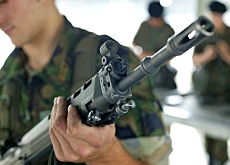Police chief demands anti-extremist unit

The police chief of canton Valais has called for the creation of a special unit aimed at breaking up events such as a recent neo-Nazi concert held near Brig.
Swiss Justice Minister Christoph Blocher says though that local authorities are warned in time to handle such situations.
Bernard Geiger, head of canton Valais police, to the Blick tabloid that local forces were powerless to handle these events at short notice. Police were only informed of the approximate location of the concert, which brought together around 400 Swiss and foreign neo-Nazis, the day before.
According to Geiger, the police have enough staff at their disposal to handle large events or disturbances if given sufficient warning.
“Breaking up a neo-Nazi concert at short notice is a far different proposition, ” he said. “We would have needed a lot more manpower.”
Geiger said there is an accord between cantons to supply extra officers, but it is only for planned events such as football matches, concerts or demonstrations. For the police chief, the solution would be to create an intercantonal force for emergency situations.
“We need a reserve troop made up of officers from all cantons and trained for this purpose,” he added.
Warning given
Valais police have complained of being informed too late of the location of the concert. Justice minister Blocher has defended his services, saying they sent out a warning to all cantons that an event could take place a week before it happened.
On Saturday, Blocher told the Berner Zeitung newspaper in an interview that the approximate location of the concert was only revealed on September 16, the day before it took place.
According to the justice minister, the police then had three options at their disposal: ban the concert, keep a close eye on it or break it up. Blocher said that the event went ahead for security reasons.
Local police were not happy with the outcome. They said that declarations by the concert organisers that they cooperated with the authorities were false.
Geiger said that the organisers were in fact warned their event was illegal and that they could expect to be hauled in front of a judge.
The police chief added that his staff was left with two “bad” options: either break up the concert with the risk of violence breaking out, or make police presence felt, check identities and take some participants into custody.
The second option was chosen, with the organisers, music groups and some spectators identified as the main protagonists.
Anti-racism legislation
An investigation is now underway for violations of Switzerland’s anti-racism laws and the organisation of an illegal concert. A police spokesman said a large number of people were being investigated, including the tenants and the owners of the nightclub where the event was held.
Footage shown on Swiss public television has shown that the texts of the songs played during the concert were considered racist under Swiss legislation.
Neo-Nazis have made their presence felt in recent months. Large numbers turned up on Swiss National Day, August 1, at the Rütli meadow, the traditional birthplace of Switzerland and disrupted President Samuel Schmid’s speech.
Police did not intervene.
Blocher said the media are partly responsible for the neo-Nazis events taking place. By highlighting their presence, the press is giving them the kind of attention they crave.
The justice minister pointed the finger at Blick especially, blaming the tabloid for talking for weeks about the neo-Nazis travelling to the Rütli for National Day. He added that extremists were sure to turn up with heightened media interest.
swissinfo with agencies
On September 17, around 400 Swiss, Italian, German, French and Austrian neo-Nazis met in Gamsen near Brig for a concert in memory of British extremist singer Ian Stuart.
This type of concert is illegal in Switzerland, but police decided not to break it up for security reasons, sending 30 officers to keep the location under surveillance.
Investigators have identified the concert organisers as well as the members of the five groups that played.

In compliance with the JTI standards
More: SWI swissinfo.ch certified by the Journalism Trust Initiative











You can find an overview of ongoing debates with our journalists here . Please join us!
If you want to start a conversation about a topic raised in this article or want to report factual errors, email us at english@swissinfo.ch.